- Home
- Adam Cesare
All-Night Terror Page 7
All-Night Terror Read online
Page 7
Danny was hanging on every word when the phone rang. He bounced off the couch cushion.
Who’s calling at this hour?
“Hey, man, are you seeing this crazy shit?” Scott asked.
There was a sleepover at Andre’s place, which Danny hadn’t wanted to join. They scored two six-packs of Zima, and judging from the sound of Scott’s voice, they had long since polished them off. “Dre says this is fake, but I dunno, man. You see the way that old guy fell down earlier?”
Danny nodded, his attention torn between his best friend and the bloodied horror emcee. He realized his nod couldn’t be heard over the phone, so he um-hmm’d.
“I just wanted to make sure you were watching. Pretty cool movies too, huh? Can you believe we haven’t seen these before? I don’t think the video stores even have ’em.”
They definitely did not. Danny hung up without saying goodbye, letting Scott get back to the sleepover and finding himself wishing he were there.
The count was attempting to set the appropriate stage for the night’s fifth movie when he abandoned his performer’s voice and script, raised the gun, and pointed it straight at the camera.
“You always were an asshole, Mike.”
He pulled the trigger and the camera drifted upward, giving Danny a view of the rafters.
Then the next movie started.
Gore Galore
You’re having one of those dreams again. Only you’re not having a dream, you’re having a movie.
It’s a movie that you made, but you barely remember most of these: the gore pictures.
At the time they made you money, though. Thanks to DVD, they’re the only ones that still do, really.
The nudie pictures don’t sell that well anymore. You let the rights lapse on half of them anyway, so you wouldn’t be getting money even if they did. There’s no real audience for soft-core movies like that now. Not when anyone with a cell phone can type in a word and see all the things that you couldn’t show, wouldn’t show even if you were allowed to back then.
No, you were always a class act.
You don’t remember the scene from this movie you’re having. Everything in it is tinted blue, and you realize that’s because it’s supposed to be nighttime. Shooting day-for-night in the Florida sun was never very convincing, was it?
You step forward, further into the frame.
There’s a guy here with you. You remember him, if not his name, then his outline. Your camera—your gaze—follows him. He’s tall and you have to crane your neck to see his face, this close. He was a local actor. You found him in a community production of Arsenic and Old Lace. He was playing the Karloff part, of course. Look at that mug. How could he not?
It’s strange that right now you can’t remember his name. He’s kind of important to your life and career. Well, maybe it’s not so strange. Your memory’s not what it used to be.
Eighty-seven years is a long time to be on the earth, a long enough time that most of the places you shot this movie don’t exist anymore. The movie theaters that played it are gone too. And the drive-ins? Forget about it. They’re empty lots and shopping malls now.
The guy is lurking outside of a window, peering in and breathing heavy. He’s wearing a satin cloak, black on the outside and red on the inside. The cape makes him look like a magician. But he’s not a magician. That was one of your other movies, the one with the killer magician. What was this cat’s deal? You can’t remember. Maybe he’s wearing the cape because you had it left over from the magician movie and it added production value. Did this movie even get distribution? Did you finish it?
He lifts up the window; it’s unlocked. He climbs in. You want to follow him, but your knees ache. You’re old, for Christ’s sake.
You look up at the “moonlight,” and the moon looks an awful lot like the sun. A seagull flies by. The alien blue of the day-for-night hurts your eyes worse than the pain in your knees, so you climb in, following the guy whose name you can’t remember.
The other side of the window isn’t actually the other side of the window. You shot the exteriors at a different location than the interiors. So, in effect, what you’ve done by climbing through the window is traveled six blocks north and four west. It’s a movie, though, so that kind of thing is not only possible, it’s commonplace.
You remember now. Not the actor’s name but what movie this is. It’s her movie, and here she is.
She’s beautiful, as young as you’ve ever seen her and twice as blonde.
Margret. You know her name. Even if this wasn’t a movie of your own construction, even if this wasn’t a movie that you revisit often, you feel that you’d still know Margret’s name.
You’re in her bedroom. Well, not Margret’s bedroom, it’s her character’s bedroom.
She doesn’t see the Karloff guy at first. She’s sitting in front of her vanity, brushing her hair before lying down for the night. She’s got on a see-through negligee. This was as much nudity as you’d usually allow in these films. You were a king of exploitation, but you tried to exploit only one thing at a time. In this movie you were focusing on blood, not flesh.
He approaches her, spreading his cape wide, like he’s going to be able to take flight in this small Tampa apartment. Now you remember what the deal with the cape is: this guy was supposed to be a Satanist. This was a later-career picture, after Rosemary’s Baby. You were trying to stay relevant.
Margret still doesn’t see him, keeps brushing her hair until he’s close enough that the red of his cloak begins reflecting off the mirror of her boudoir. Then she sees him, the refracted red light turning her blonde hair pink, all without having to change the lighting or install a gel over any of the bulbs. On the day, it was a happy accident.
She screams and he lets her.
Not the most realistic film. If this guy were a real Satanist murderer lunatic, he would probably want to muffle her screams, to stop her from calling for help. But he doesn’t; he lets her scream as he creeps forward on the tips of his toes. The guy had stage experience, was probably a dancer at some point, given how easily he can move across the room like that without ballet shoes.
Between these takes is when you fell in love with her. It would be a story to tell your children, if you’d had any, once they were old enough to know that all of this stuff is pretend.
The Satanist is finally on her, enfolding her in his cape and then throwing her on the bed. She fights him—Margret was a fighter. For days after this, she had bruises. You wouldn’t have known that about any of the other actresses, but you took this one out to dinner once production had wrapped and the sun had gone down.
Once she’s on the bed is when the special effects come into play, even if you can’t tell in this shot. The bed isn’t real, had been hollowed out so Margret could poke her head through the top, by the pillows, so that her neck would mesh with the dummy body laid on the rest of the mattress.
It looked pretty convincing if you didn’t know what to look for; the prop guy had even painted nipples on the mannequin, even though you could barely see them through the nightgown.
The Satanist is muttering pig-Latin gibberish right now, but you only glance at him, all of your attention on Margret’s young face. She’s five years younger than you, which now wouldn’t mean much, but on the set it meant that she was fresh out of secretary school and you were pushing thirty. Scandalous.
You want to hold her hand for what’s going to happen next, but you can’t—this is just a movie.
The Satanist unsheathes his weapon, a knife long enough to be called a sword, from a pocket that the prop guy has sewn into the edge of the cloak. There are stars and snakes drawn onto the blade in black and red paint. Some of the stars are pentagrams. Some of them are fuckups that ended up as the Star of David.
He bows his head in one more made-up prayer, then brings the blade down, severing Margret’s leg at the knee.
She screams, so loud and with such anguish that you buy it; this time it’s
not fake, she really just lost her leg.
You invented this. Not this scene, but this entire genre. They call you a lot of different names now, all of them meant as terms of endearment. You’re either the Godfather or the Grandfather of Gore, depending on how old the writer wants to make you sound.
Hell, you not only invented a genre—if you’re being honest with yourself—you started a culture. You didn’t know it at the time, of course. All you were doing was working your way into the drive-in market with something that sold tickets and was cheap to produce. But now you go to conventions built around this stuff, listen to pimply kids tell you how much your films mean to them.
They’re all sick.
You look at Margret; the blood pumping out of her leg looks so wrong, so bright. It’s paint.
For research, you looked up color photographs in medical texts, but you didn’t have the makeup guys stick to them. The gore in your films was purposefully unreal, not only to make it flashier but to preserve a little bit of dignity on your part. If it looks like a cartoon, then it’s fun, right?
The Satanist has taken her hand off now, is waving it at her.
Margret has crossed her eyes now, is making an attempt to look like she’s lapsing into shock. That’s not what death looks like. You know that now, but didn’t then.
This scene feels like it goes on forever, and that’s not a trick of the imagination—it does. With runtimes that never break the ninety-minute mark, you aimed to make the gore scenes in your movies take up 60 percent of the footage, even if that meant they got boring.
You watch until something wakes you up. By the end of it, Margret is just a torso and a head, the bed soaked in red paint. In the absolute final moment, she’s just a torso.
***
You’re no longer in the movie; you’re no longer dreaming at all. Instead you’re awake in bed, the pain in your bladder immense.
Some nights you piss yourself, but it’s never on purpose. If you’re awake when you need to go, you make it to the bathroom. Or at least you have made it to the bathroom. You know that there’s going to come a day when you don’t.
With what feels like great effort, you swing your arm over to the big plastic button on your nightstand and all the lights in the room click on. It’s still dark outside the window, and the bedside clock tells you that it’s a little after three in the morning. The amount of time you can sleep without getting up to piss is getting shorter and shorter, your bladder now the size of a child’s coin purse.
The bedroom has changed immeasurably in the last five years, doesn’t even seem like the same place. The king bed that you used to share with Margret has been moved out, in favor of an adjustable queen, the kind they have in hospitals or old folks’ homes. You don’t feel any shame in it. You’re old, so you bought the things that help old people.
There’s no more superfluous furniture, nothing for you to trip on and hurt yourself. There’s just a television bolted above the bed and a small dresser.
You put your feet over the side of the bed and sit up. In an effort to minimize the pain that you know is coming, you press down against the carpet with your feet, getting your knees used to the idea that they’re going to be doing some heavy lifting in a moment. When you’re tired of pressing down, the pins and needles as good as they’re likely to get, you stand up and limp to the bathroom.
Sliding the padded underwear down, you realize that you didn’t make it, not entirely. You empty the rest of your bladder into the toilet, and then change your underwear before getting back in bed.
***
You’re having that dream again. Only it’s not a dream, it’s a memory.
It’s 1982 and you’re in the Panhandle, outside Tallahassee. Not somewhere you’re comfortable. Florida’s not the real South, but this is as close as it gets.
You look up at the night sky and it’s black. There are clouds blotting out the moon and stars. That’s good, nobody needs to see you.
You’re doing something that you promised Margret you wouldn’t. Well, she never specifically said not to do this, but she told you never to confront her father. She wanted you to let it be once you’d found out.
Margret’s been seeing a doctor for the past two years; you insisted, you paid for it. It seemed to help her—she cried less—but it never much helped you. You were still so angry, wished that you didn’t have that knowledge, or you’d had a time machine.
You’re outside a house now. It’s more like a shack, really. Margret’s family never had much money. She always joked about being a redneck, but when you were dating, she seemed so elegant, cosmopolitan. It wasn’t until after you were married that you’d visited the Panhandle, saw that she wasn’t kidding.
You knew that she never got along well with her parents. That’s the only reason you’d married her without meeting her folks. To your knowledge, she never even phoned or wrote to let them know she was married. But then her mother got sick, and it was time to visit this place.
That was seventy-... seven? Maybe? Well, whenever it was, you didn’t know about her father when you met him the first time.
The shack had looked better when Margret’s mother had been alive to take care of the place. Now there’s a stack of beer cans on the porch chair, tufts of grass shooting up through the floorboards. You don’t go onto the porch; it looks rickety and you don’t want to make any noise, you don’t want him knowing you’re here.
You walk around the house, peeking in the windows. There are no neighbors, but you still try to do it quickly and quietly. When you reach the window you want, you test to see if it’s locked. It’s not. You’re fifty-two, not in the best shape of your life but more than capable of lifting yourself onto the sill and lowering yourself into the room without making much noise. The muscles in your arms strain as your feet touch the ground and relieve your biceps.
Despite the creaking of floorboards and the clatter of the old window being lifted in its frame, he’s still asleep. At least it looks like he is. You’re on the other side of the room, so it’s hard to see his eyes in the darkness. You creep to him while at the same time dipping into your pocket for the thing you’ve brought.
The knife is hard to open with the thick gloves you’re wearing. You can’t put your fingernail in the notch cut into the steel for lifting the blade. You get it open, though, pinching with two fingers and gliding the blade out.
You hope that you won’t need it, but maybe you will.
He’s under you now; your shadow would fall on him if there were enough light to cause a shadow. It’s not like your movies; it’s flatly lit, uninviting, murky. An audience wouldn’t even be able to tell what the hell was going on as you lift the pillow from beside his head.
You’ve got a version of the plan that mostly comes from movies you’ve seen, not the ones you’ve made. You see yourself putting the pillow over his mouth and pressing down with one hand, then him drifting off to a deeper sleep.
That’s not the way it goes, though. The old man still has plenty of fight in him, and murder victims don’t just lie there, supine, ready to be snuffed out.
This is why you kept the knife in your other hand. In the years since this night, you’ve admitted to yourself that it was always going to be the knife-centric plan, the pillow was just for show.
You stab down, not across his neck. You’ve killed lobsters like this before, but unlike a lobster, her father doesn’t go limp. He’s gasping for air under the pillow now, possibly trying to speak.
After you take the knife out, there’s a thin stream of dark blood shooting through the air. It’s so much different than one of your movies. As you stab him again, somewhere over his heart this time, you remember a fan letter that you’d gotten that morning.
Have you ever seen Faces of Death? It’s like your movies but real! So great!
Sometimes you only skimmed the letters, then sent a signed photograph back to the fan if they included a stamp in their envelope. But this one you’d read in its entire
ty, and it made you sick.
People were getting off on this.
The knife didn’t go far into the old man’s chest, had hit a rib. You turn the blade and force it down, getting in between the bones.
The dark room is darker now, the old man’s blood spreading over the sheets like a black hole, expanding far enough that it threatened to suck the whole shack into it.
Before you leave, you rinse off the knife to the best of your ability and leave it in the sink. After that, you go through the rest of the shack and toss it, making it look like the old man was killed by a thief. You pocket the twenty-two dollars in bills that you find on top of his dresser.
You’re never even questioned about this night. Not by the police, and not by Margret. You don’t go to the funeral, but she does. Ten years later, she dies of the same thing that her mother did.
***
Waking up, you don’t remember the specifics of your dreams, but you know that you’ll have them for the rest of your life. However much longer that is.
There’s light outside your window.
Intermission #5
Bob glanced at the clock above the door and realized it was almost over; dawn would be approaching.
The police were just outside the booth now. He heard their movements in the hallway that shared a wall with the booth, and knew there was only one thing keeping him alive: Fred.
That was just fine, because he needed this son of a bitch to get the last movie up and running in just under ten minutes. After that, he supposed he could let him go, but what kind of lame-ass ending would that be? Nah, no one got to walk away from this.
Not even me.
Bob fished an unfiltered Camel out of the crumpled pack dangling from Fred’s breast pocket and lit it. This had been a cathartic evening full of laughs and tears, but as that clock ticked toward daybreak, he felt fear set in.

 Clown in a Cornfield
Clown in a Cornfield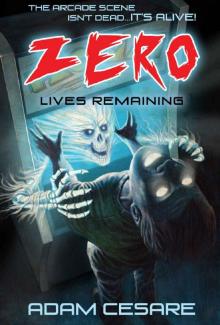 Zero Lives Remaining
Zero Lives Remaining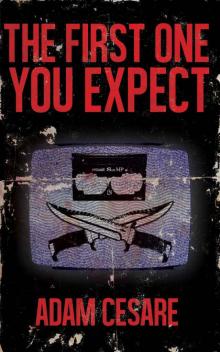 The First One You Expect
The First One You Expect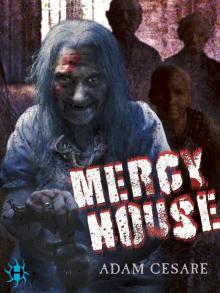 Mercy House
Mercy House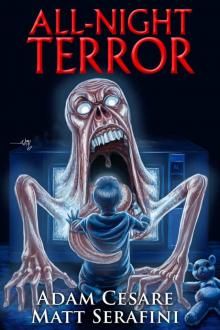 All-Night Terror
All-Night Terror The Con Season: A Novel of Survival Horror
The Con Season: A Novel of Survival Horror Bone Meal Broth
Bone Meal Broth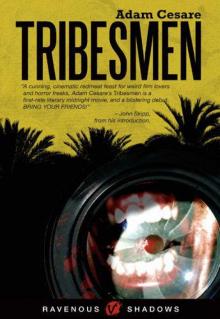 Tribesmen
Tribesmen